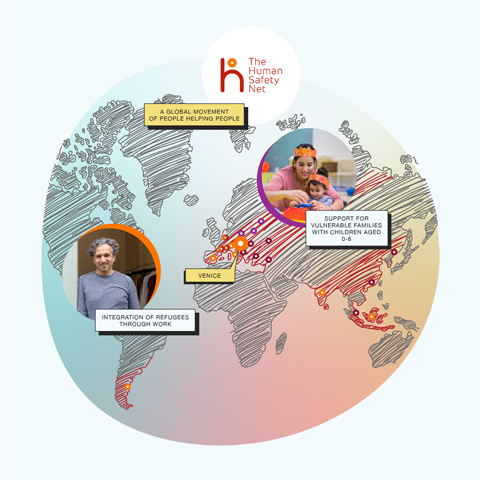Dream of a Venetian night
The building is very old, the ceilings are ancient and full of drawings on the walls and wooden coffers; a long corridor with arches crosses all the rooms, one by one. It is night, but we move without fear.
It’s like stepping into the past, or maybe I really am there.
The windows on our right look out onto one of the most famous squares in the world. I had only seen it in photos before today: St. Mark’s Square.
We are in Venice, in the Procuratie Vecchie.
I don’t even know how we came to be in Italy, but now, inside this place, on this Venetian night, it’s not important.
Our life, especially that of my daughter, little Jana, has changed since I moved to the capital a year ago from a small village 70 kilometres from Bratislava. They referred me to this association that offers support to parents with young children for booking medical visits and finding support in an unfamiliar city. The educators invited me to meetings and I met other mothers, some of whom had the same difficulties as me, and just talking with them made me feel better.
But what worried me the most, at that time, was that my daughter would have to live the same life I had: I didn’t feel able to give her the necessary tools to ensure she would develop her own skills, and give her more opportunities in life. At this stage in my life, the association helped me a lot: the educators taught me many activities to do with Jana, including recycling objects we had at home, while we became close friends with the mothers and their children.
At the end of the year, they invited us to come here to Venice, to the home of The Human Safety Net, a network of people helping people, to which our association belongs.
The building seems deserted, but we soon discover that we’re not alone. There’s another family with us: they come from Syria and there are six of them, father, mother, and four children, also members of The Human Safety Net.
The father is called Anas.
He’s a nice man, quite unusual, with his waistcoat and strip of white beard. In Syria he used to work in agriculture, but he was forced to flee, taking his family to Germany because of the war. As we walk through the rooms of the Procuratie Vecchie, he explains that he managed to reopen his agricultural business with the help of a German association and now he is back to making cold oil, from sunflowers and other plants, to guarantee a more peaceful future for his family through his work.
At a certain point, a gentleman in a long red velvet robe appears as if out of nowhere. He looks like one of those portraits we saw hanging in the hotel lobby.
He catches me by surprise, but we all follow him and Jana, curious and wide-eyed, squeezes my hand tightly. He shows us the rooms as if he were the owner of the house. He tells us that he’s a Procurator of Saint Mark who takes care of the territories of Venice around the world but also has the task of taking care of orphans and those most in need.
But when I turn to meet Anas’s gaze and comment on this experience, everything vanishes and, in that moment, I wake up.
We were in the bed of a hotel room from which the sound of motorboats could be heard along the canals of Venice, and I remembered that we were there for the long-awaited reopening to the public, the following day, of those very rooms I had just dreamed about. Those rooms are the headquarters of The Human Safety Net, a network of people helping people in more than 20 countries. It was a wonderful dream, but the most important one for me is to see my little girl grow, and imagine a better future for her.
History

The Human Safety Net is the global initiative for Generali’s communities. Launched in 2017, its mission is to unlock the potential of people living in more vulnerable circumstances. The Human Safety Net offers support to parents with children up to the age of six, with parenting support courses in over 200 family centres, and supports refugees by helping them become entrepreneurs and integrate into their host society through work. It works with more than 50 non-profit organisations and social enterprises that implement programmes in over 23 countries in Europe, Latin America, and Asia. Since its conception, the network has been open to working in partnership with other organisations, foundations and institutions that share its vision.
The Human Safety Net is a movement of people helping people, active in the countries where Generali is present. Many employees and agents are, in fact, actively involved as volunteers or experts to support partner NGOs, families, and refugees. The focal point of The Human Safety Net’s activities is the Procuratie Vecchie in St. Mark’s Square in Venice, a global hub – which will soon open to the public – developing social action and innovation for a more inclusive future.
